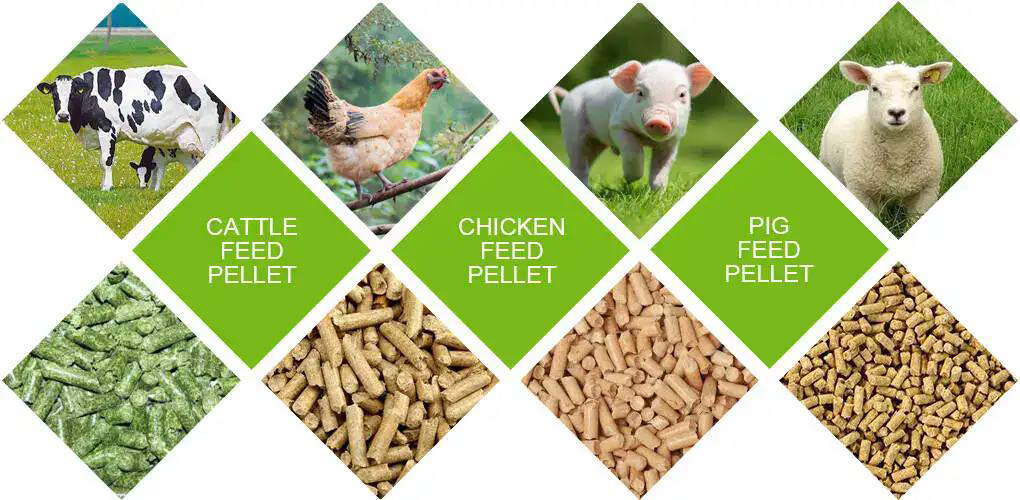pet feed mill
A pet feed mill is an industrial facility specialized in producing and processing pet food. Its main goal is to manufacture nutritious, healthy, safe, and palatable pet food to meet the dietary needs of various pets, such as dogs, cats, birds, fish, and other small mammals.
pet feed mill Introduction
A pet feed mill is an industrial facility specialized in producing and processing pet food. Its main goal is to manufacture nutritious, healthy, safe, and palatable pet food to meet the dietary needs of various pets, such as dogs, cats, birds, fish, and other small mammals. These mills typically employ advanced production technologies and strict quality control measures to ensure high-quality and safe products.


Main Functions of a Pet Feed Mill
Feed Formulation Design
Designing and formulating feed recipes tailored to the nutritional needs of different pets based on their breed, age, weight, activity level, and specific health requirements.
Raw Material Procurement and Management
Procuring high-quality raw materials such as meat, grains, vegetables, vitamins, and mineral supplements from reliable suppliers and managing and storing them effectively to ensure their safety and freshness.
Processing and Production
Utilizing equipment and processes like grinding, mixing, pelleting, and baking to process raw materials into high-quality, nutritionally balanced pet food, enhancing the food’s palatability and storage stability.
Quality Control
Implementing strict quality control measures during production, including nutritional composition and safety testing of raw materials and finished products, ensuring compliance with standards and safety requirements.
Packaging and Distribution
Standardizing the packaging of produced pet food to facilitate storage, transportation, and sale, meeting the needs of different pet owners.
Technical Support and Services
Providing pet food usage advice, technical training, and after-sales service to help pet owners and caregivers better manage their pets’ dietary health.


Main structure of a pet food mill
Raw material receiving and storage area
Used for receiving and storing various raw materials necessary for pet food production, including meat, grains, vegetables, vitamins, minerals, etc., ensuring the freshness and safety of the ingredients.
Grinding equipment
Processes raw materials into smaller particles for subsequent mixing and pelletizing processes.
Mixing equipment
Blends various ingredients according to formulation ratios to ensure consistency in nutritional composition across each batch.
Pelletizing equipment
Shapes the mixed feed ingredients into pellets to enhance palatability and storage stability of pet food.
Drying equipment
Removes moisture from the pellets to prevent mold and spoilage.
Packaging equipment
Packages finished pet food into different sizes and forms (bags or bulk) for storage, transportation, and sale.
Quality control laboratory
Conducts rigorous testing of raw materials and finished pet food for nutritional content, microbial safety, etc., ensuring compliance with relevant standards and regulations.
Warehousing facilities
Stores finished pet food safely and maintains product quality before distribution.
Automation control systems
Modern feed mills are equipped with automated control systems to monitor and regulate various stages of production, enhancing production efficiency and product quality.


Main Advantages of a Pet Feed Mill
Customized Feed Formulations
Offering customized feed recipes based on pets’ specific needs, ensuring optimal nutritional support for each pet.
High-Quality Raw Material Procurement
Sourcing high-quality raw materials through collaboration with reliable suppliers, ensuring the produced pet food is safe, healthy, and nutritionally rich.
Advanced Processing Technology
Using advanced production technologies and processes to enhance the palatability, uniformity, and storage stability of pet food, ensuring high-quality products.
Strict Quality Control
Implementing rigorous quality control measures during production to ensure the food meets standards and requirements, providing safe and healthy pet food.
Efficient Production Capacity
Modern production equipment and automated control systems increase production efficiency and product quality, enabling a rapid response to market demand and timely food supply.
Cost Savings
Optimizing production processes and management practices to reduce production costs, offering competitive pricing to customers, and helping pet owners save on feeding costs.
Reliable Supply Chain Management
Establishing a stable and reliable supply chain for raw materials and product distribution to ensure timely food supply and reduce the risk of food shortages for pet owners.
Technical Support and Customer Service
Providing professional technical support, usage guidance, and after-sales service to help customers solve problems in pet care, enhancing food utilization and pet health.
Application of pet feed mill
Typically, the production of animal feed processing plant uses raw materials such as corn, soybeans, wheat, and other nutrients as the formula. Our small feed mill plant are specially used to produce feed for poultry, livestock, pigs, horses, cattle, sheep, chickens, ducks, goose and other animals.For different animals, with different growth cycles, (chicks, suckling pigs, calves, etc.), the feed pellet size required is different, but our feed production line only needs to replace ring molds with different apertures or use a pellet crumbler to reach the required size.

Parameter of pet feed mill
| Model | Capacity | Main Motor Power | Feeder Motor Power | Conditioner Power | Dia. of Ring Die | Pellet Size |
| SZLH250 | 1-2T/H | 22KW | 0.75kw | 1.5kw | 250mm | 2-12mm |
| SZLH320 | 3-4T/H | 37KW | 1.5kw | 2.2kw | 320mm | 2-12mm |
| SZLH350 | 5-7T/H | 55KW | 1.5kw | 3kw | 350mm | 2-12mm |
| SZLH420 | 8-12T/H | 110KW | 1.5kw | 7.5kw | 420mm | 2-12mm |
| SZLH508 | 10-18T/H | 160KW | 2.2kw | 11kw | 508mm | 2-12mm |
| SZLH558 | 15-25T/H | 180KW | 2.2kw | 11kw | 558mm | 2-12mm |
| SZLH678 | 20-30T/H | 220KW | 2.2kw | 11kw | 678mm | 2-12mm |
| SZLH768 | 25-42T/H | 280KW | 2.2kw | 11kw | 768mm | 2-12mm |






